The Fabulous Fulbrights
Ten exceptional USC Dornsife students have been selected for the prestigious Fulbright Fellowship, which awards them for academic achievement and commitment to cultural engagement.
USC has been recognized as one of the top 40 research institutions in the United States to cultivate Fulbright Student Grant recipients, according to the Fulbright Program, the U.S. government’s flagship international educational exchange program.
Established in 1946 and sponsored by the United States Department of State’s Bureau of Educational and Cultural Affairs, the Fulbright is the largest international fellowship program in the U.S. Each year, about 2,000 grants are given to support independent study, research and teaching in more than 150 countries worldwide.
In the past five years, 38 USC Dornsife students have earned this honorable distinction. The 2013-14 Fulbright recipients include:
Women in Power
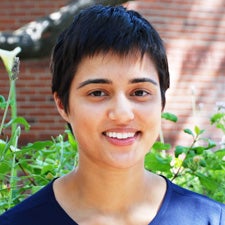
Jasneet Aulakh, a senior triple-major in history, English and philosophy in USC Dornsife, is deferring graduate school at Cambridge University to study the role of women in village governments in India. Photo by Laura Paisley.
Jasneet Aulakh was thrilled when one of her aunts in India won a seat on her village government board.
That was until she learned that her aunt’s appointment was mainly intended to facilitate her uncle’s entry into local government — known as a proxy vote.
“It’s easier for women to get these positions, so sometimes a man will put his wife’s name on the ballot and basically run the show himself and attend all the meetings,” said Aulakh, a senior triple-major in history, English and philosophy.
Aulakh is using her Fulbright to study the role of women in village governments in India. A speaker of Punjabi and Hindi whose parents migrated from India, Aulakh will travel throughout the country for a year, interviewing elected women from various socio-economic, religious, partisan and caste backgrounds.
She plans to study the effects of India’s 73rd Constitutional Amendment Act of 1993, which mandates that village governments reserve one-third of seats for women.
“I was motivated, in part, because I couldn’t find much literature or criticism on the topic of ‘proxy votes’ beyond a few paragraphs or very biased pieces in which the practice was discredited as a rumor. I want to see if anyone has been combatting these issues in a constructive way, so that India isn’t just paying lip service to reforms for equality.”
She hopes to find examples of the system that do work.
“If so,” said Aulakh, who plans to pursue graduate school at Cambridge University, “I will see how they made it work and perhaps identify practical models that could be shared.” —L.P.
Content is King
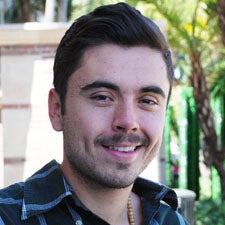
Juan Espinoza, a senior double-major in international relations in USC Dornsife and at USC Annenberg School of Journalism and Communication, will earn a master’s degree in communication at Mexico City’s Universidad Iberoamericana. Photo by Laura Paisley.
The Associated Press officially dropped the term “illegal immigrant” in its stylebook in early April, preferring the phrase “undocumented,” and the Los Angeles Times followed suit a month later.
For Juan Espinoza, this is an important victory.
“The media absolutely shapes how we think and who we are,” he said, emphasizing that the Los Angeles-Long Beach metropolitan area has the nation’s largest Latino population. “So understanding communication, culture and the way content gets produced is something I’m really passionate about.”
Espinoza, a senior double-major in international relations and communications, is among three Americans selected for Fulbright-funded graduate study in Mexico. He will spend the next two years earning a master’s degree at Mexico City’s Universidad Iberoamericana, considered the country’s top university for communication studies.
He will investigate how popular culture content for new media, newspapers, radio and television is produced in Mexico and the United States. He’s interested in how content affects communities and how Latino communities can be better and more accurately represented in the media.
Espinoza is thrilled to be attending the Universidad Iberoamericana, where his role model in Spanish language media, Jorge Ramos of Univision studied. Former president of Mexico Vicente Fox, whom Espinoza recently met on campus at a USC Schwarzenegger Institute for State and Global Policy event, is also an alumnus.
“I’ve always wanted to be a student in Mexico — it has such significant growth potential for the 21st century,” said Espinoza, who speaks fluent Spanish. “I’d like to think of myself as being on the cusp of that growth — bridging the gap between Mexico and the U.S. in terms of media and communications.” —L.P.
Diplomacy in India
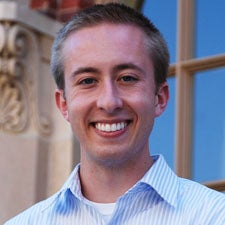
Travis Glynn, a senior international relations major in USC Dornsife with a focus on securities studies, will spend his Fulbright year in India as an English teaching assistant. Photo by Laura Paisley.
Each day while studying in India, Travis Glynn passed the same man on the street vending grilled corn from a little stand. Each day, the man greeted him in Urdu. Near the end of Glynn’s 12-week stay, the vendor waved him over and asked him to try his corn.
“He started asking me all these questions about America — in Urdu,” Glynn recalled of the research trip he took in 2011 through the Critical Language Scholarship Program, sponsored by the U.S. Department of State.
“First it was just the corn vender, then his whole family came over, asking all these questions. To be able to actually understand them and then formulate responses was really exciting. I loved the familial, genuine nature of the exchange. I’m sure I made plenty of mistakes, but it was awesome.”
Glynn, a senior international relations major with a focus on securities studies, will spend his Fulbright year in India as an English teaching assistant and researcher. His focus will be diplomacy and how culture plays into policy — specifically, how Indian students learn about the U.S. through English language instruction by Americans and how their perceptions of the U.S. change as their exposure to Americans increases. He also wants to investigate how diplomats in Indian government interact with U.S. diplomats.
“I want to truly understand Indian culture and how U.S. policy affects India’s people,” Glynn said. “I believe in working with countries rather than working for them.”
Upon his return to the U.S., Glynn will attend graduate school on a prestigious Harry S. Truman Scholarship, awarded in 2012 in recognition of his public service, academics and leadership. Eventually, he wants to work for the foreign service in public diplomacy. —L.P.
Fission and Fusion
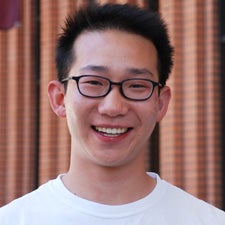
Andrew Ju, a senior international relations (global business) major in USC Dornsife, will spend a year studying the political economy of the nuclear energy industry in Seoul, South Korea. Photo by Laura Paisley.
Senior Andrew Ju is a Southern Californian through and through. His demeanor is relaxed and friendly, he travels via long board and has never experienced a true “winter.”
At least one of those things will forever change during his year studying the political economy of the nuclear energy industry in Seoul, South Korea.
The son of South Korean immigrants, Ju already speaks some Korean. Two years ago he spent a summer in Seoul studying the politics of North and South Korea, which included a visit to the Demilitarized Zone (DMZ), the strip of land running across the Korean Peninsula that serves as the buffer between North and South.
“The DMZ is such a tangible representation of what I study in international relations: conflict between two countries. It became very real.”
Through his coursework as a global business major in USC Dornsife, his research interests have shifted toward nuclear energy — which he considers one of the great paradoxes of today’s world.
“On the one hand, with its enormous carbon-free energy output, it offers a solution to today’s major problems of pollution and unsustainable energy use. But on the other hand, it carries equally enormous risks for the environment and human safety,” he said.
While the use of nuclear energy has always been debated, countries like the United States and Japan as well as western Europe in the past have been nuclear power’s most vociferous champions. Now, countries such as China and South Korea are emerging as the potential future leaders of this technology, Ju said.
“This is an incredible opportunity to study such an exciting technology in a country that might one day become one of the centers of nuclear energy importance. I can’t imagine a better time to study this topic.” —L.P.
Chinoiserie Chic
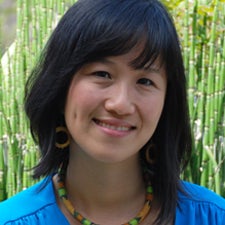
Ana Lee, a Ph.D. student in comparative literature in USC Dornsife, will conduct research at the New University of Lisbon, Portugal. She will examine the circulation of Asian export art and chinoiserie by Portuguese merchants. Photo by Laura Paisley.
A descendent of Chinese grandparents and Taiwanese parents, Ana Paulina Lee grew up between the climes of São Paulo, Brazil, and Queens, New York.
As a doctoral scholar of comparative literature, her research draws upon her upbringing living across East, West, North and South to challenge the dominant geographical paradigms that compose such boundaries.
As a Fulbright scholar, Lee will examine the rich trade partnership that flourished between China and the Portuguese empire during the latter’s 16th century sea-borne expansion into the 19th century. The trading extended to chinoiserie — art such as export porcelain or paintings reflecting Chinese influences and characterized by the use of fanciful Chinese imagery, designs and locations.
“Starting in the 16th century, the Portuguese empire began to embrace Asian art and chinoiserie as a way of portraying itself around the world. In Portuguese colonies like Goa, Macau and Brazil, a hybrid Luso-Asian art developed to depict the Portuguese maritime expansion.”
Speaking fluent Portuguese, Spanish and Mandarin, Lee’s Fulbright will allow her to study chinoiserie in Portugal at the Universidade Nova de Lisboa. The university has a unique master’s program focused on the role of art during the Portuguese sea-borne expansion from the 16th through 19th centuries.
In Lisbon, she will take classes in that program in addition to conducting research in churches, archives, private collections and museums. She plans to study porcelain objects made by Chinese artists, commissioned by Portuguese merchants, and chinoiserie used in religion such as on church altars.
“I am grateful for this year-long opportunity to develop historical depth for my research.” —L.P.
Development in Real Time
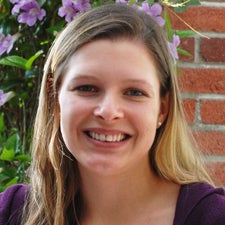
Megan Rilkoff, a comparative literature and French double-major in USC Dornsife who is interested in international development, will travel to the emerging economy of Laos to teach English to university students. Photo by Laura Paisley.
Megan Rilkoff was eager to travel abroad following graduation, somewhere in Southeast Asia and “completely different.”
After three years working as a program assistant for USC Dornsife’s Joint Educational Project (JEP), she wanted to continue her involvement with education, particularly to examine its role in economic and cultural development.
A comparative literature and French double major, one of Rilkoff’s favorite professors, Panivong Norindr, is Laotian and talked to her about the country.
“He said it was very beautiful, safe and welcoming,” Rilkoff said. “I thought it sounded perfect.”
Admittedly, she had to double check the map to pinpoint its exact location. But now that she will be teaching English there at a local university in the capital of Vientiane as a Fulbright fellow, she knows the country with a population of 6.5 million is bordered by Burma and China to the northwest, Vietnam to the east, Cambodia to the south and Thailand to the west.
The only landlocked country in Southeast Asia, Laos is the poorest country in the region. However, foreign investment in hydro, mining and construction has spurred Laos’ growth and reduction of poverty over the past two decades. The country currently has among the fastest-growing economies in Southeast Asia.
Rilkoff is interested in the field of international development, so she’s excited about experiencing a developing nation firsthand. In addition to teaching, she plans to take Lao language classes and volunteer with a local (and ideally French-speaking) non-governmental organization (NGO).
“Teaching at the university in Laos, it will be really interesting to see where the country is trying to go and how they’re training their future scholars and leaders.” —L.P.
A Poet’s Painter
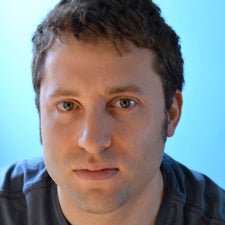
Joshua Rivkin, a Ph.D. student in creative writing and literature in USC Dornsife, is headed to Italy to research the life and work of American expat artist Cy Twombly as part of Rivkin’s current book project about the artist. Photo by Erin Beeghly.
While completing his Master of Fine Arts degree in poetry at the University of Houston, Joshua Rivkin worked as a teacher/writer-in-residence with the Writers in the Schools program. One of his jobs included leadings students through the Houston’s Menil Collection, including the art museum’s Cy Twombly Gallery.
Repeatedly visiting the gallery, Rivkin grew fascinated with Twombly’s work. Cy Twombly, a mid-century American artist, moved to Italy in the ’50s and developed a distinctive style, drawing inspiration from ancient Mediterranean mythology and epic poetry. Twombly died in 2011 at age 83.
Intrigued by Twombly’s use of color and line, Rivkin was also drawn to the way in which the artist integrated text into his paintings. Poetry by Stéphane Mallarmé, Rainer Maria Rilke and Ovid are often quoted or referenced in his artwork.
“Twombly is a complicated artist,” Rivkin said. “He’s in some ways a ‘poet’s painter’ — writing was clearly a huge inspiration for him. As a writer myself, I’m interested in the relationship between the visual and written image in Twombly’s painting and sculpture.”
Rivkin is pursuing a Ph.D. in creative writing and literature in USC Dornsife, where he has been studying with poets Mark Irwin, associate professor of English, and David St. John, professor of English.
As a Fulbright scholar, Rivkin will spend nine months in Italy working on a nonfiction book about Twombly’s life and art. He plans to interview artists and other individuals who knew Twombly. Rivkin’s book combines biography, oral history, art criticism, personal memoir, and mediations on artistic making.
“The influence of Italy on his work is essential. Seeing the places where Twombly lived and the landscapes that inspired him will allow me to better understand and capture Twombly’s life and work.” —L.P.
Community Organizer
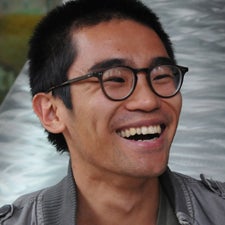
Jonathan Truong, who graduated with a bachelor’s in political science in USC Dornsife last year, will teach English at a university in Vietnam, from which his parents migrated. Photo by Pamela J. Johnson.
Jonathan Truong, his grandparents, parents and older sister, sloshed through a muddy paddy field where the rice was just sprouting green blades. Carrying aloeswood incense, mango, papaya and a traditional Vietnamese meat dish, they set up an altar at the gravesite of Truong’s great grandparents.
Truong’s great grandparents, who had migrated to southern Vietnam from China, were buried atop a small, circular island in the middle of the rice paddy.
“We prayed and gave a food offering,” recounted Pasadena-born Truong, who said the experience last summer connected him to his ancestry. Shortly after the fall of Saigon in 1975, Truong’s parents moved to Los Angeles, where they met and married. At her arrival, Truong’s mother worked in a garment factory.
“She was paid per garment,” Truong said. “Some days, she spent all her earnings on bus fare to get to and from work.”
Truong is interested in immigrant and workers’ rights. After receiving his bachelor’s in political science in 2012, he received an AmeriCorps Teaching Fellowship to conduct leadership training to high school students in Chinatown, where many youths are immigrants. His goal is to expand his work on immigrant and low-income tenant rights, a cause he pursued while an undergraduate.
In 2011 and 2012, he worked on a student campaign with advocacy groups such as UNIDAD Coalition in South L.A. to secure an agreement from USC to provide $20 million in affordable housing. The funding offsets USC’s plan for expansion.
In Vietnam, he will teach English to university students. During his 10-month stay, he plans to become fluent in Vietnamese and learn more about the culture.
“Learning the language is critical,” he said. “When I return to the U.S., I’d like to get more involved in immigrant rights’ groups. Making sure immigrants have rights as tenants and access to services.” —P.J.J.
Finding a Cure

Since a freshman, Abhishek Verma ’13 had worked in the laboratory of Chien-Ping Ko, professor of biological sciences in USC Dornsife. Verma has researched the mechanism and causes of spinal muscular atrophy (SMA). Photo by Phoebe Pan.
Wanting to become a doctor since high school, Abhishek Verma turned his attention to degenerative diseases. When he learned that spinal muscular atrophy (SMA) is the nation’s number one genetic killer of children under two, he wanted to be part of a cure.
He also wanted to work in the laboratory of Chien-Ping Ko, professor of biological sciences in USC Dornsife, whose research focuses on finding the mechanism and causes of SMA. As a freshman, Verma got that opportunity.
Then the summer of his freshman year, Verma worked as a camp counselor in Northern California and met a bright 10-year-old with a disease similar to SMA. Verma figured that out after he noticed the fifth grader had difficulty walking and lagged behind the other children.
“I saw the disease in real life,” said India-born Verma, who was raised in Palo Alto, Calif. “The disease fell out of abstraction and came into reality. Everything clicked. I returned to school with a new sense of purpose.”
Inside Ko’s laboratory, Verma compared sample neurons from mice with normal genes to mice with the mutated genes that lead to SMA. His research takes steps toward treatment and a cure for SMA, an inherited neuromuscular disease characterized by the loss of voluntary muscle function resulting from the degeneration of nerve cells in muscles of affected infants.
Of those diagnosed with SMA before age two, half die before their 2nd birthday. One in every 40 people is a carrier of the gene responsible for SMA, and one in every 6,000 babies is born with the inherited disease.
As a Fulbright recipient, Verma will work with Patrick Aebischer at the École Polytechnique Federale de Lausanne in Switzerland. Verma will examine a viable gene therapy approach to SMA by utilizing bioimaging techniques and protein assaying in his analysis. Verma graduated from USC Dornsife May 2013 with a bachelor’s in biological sciences.
After 10 months in Switzerland, Verma will seek his M.D. at Keck School of Medicine of USC. —P.J.J.
Health Matters
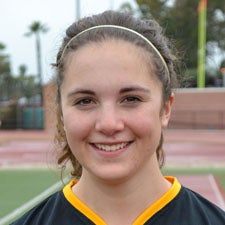
Molly Levine, a USC Dornsife minor, will travel to Thailand to teach English. She is captain of the USC Women’s Lacrosse Club. Photo courtesy of the USC Women’s Lacrosse Club.
Senior Molly Levine, a Keck School of Medicine of USC major with a minor in psychology in USC Dornsife, received a Fulbright grant to teach English in Thailand. She previously taught English at a secondary school for girls in the Nyganga township of Cape Town, South Africa, and tutored elementary school students in math and literacy through USC’s Joint Educational Project (JEP). As a teaching assistant in Thailand, Molly plans to become involved with the community outside the classroom through health-related projects.
Rebecca Braun, who graduated with a bachelor’s degree in international relations on May 17, was offered an English teaching assistantship Fulbright in Turkey. She declined the honor to fulfill a commitment in the Peace Corps.